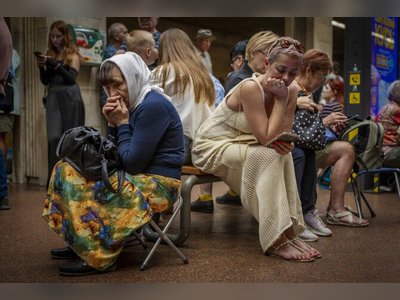
Hunger Grows in Nigeria as Aid Cuts Reduce Food Supplies
The United States and other Western countries' reduction in aid funding has led to a collapse in food supplies at nutrition centers in northeastern Nigeria, exacerbating the already dire situation for millions facing food shortages.
Dikwa: Destitute families displaced by conflict in northeastern Nigeria are finding nutrition centers closed or running low on food as a result of a significant decrease in aid funding from the United States and other Western countries.
Africa's most populous nation currently has 31 million people facing food shortages, surpassing any other country according to the UN.
The crisis is particularly severe in the northeast, where 2.3 million people have been displaced due to 15 years of war between Islamist insurgents and the army.
Hadiza Ibrahim, who has been displaced for 10 years, and her family rely on a local nutrition center in Dikwa, Borno State.
Supplies at this site are dwindling, leaving uncertain futures for those dependent on it.
Ali Abani, responsible for security at the center, reports that long-time beneficiaries have recently found themselves without access to food.
Previously, the United States provided 60% of funding for humanitarian operations in Nigeria, but President Donald Trump's decision to freeze aid in January led to a halt in this support.
The situation has worsened as other major donors such as Britain, France, and Germany have also reduced their aid budgets.
As a result, the UN World Food Programme (WFP) was forced to close 150 nutrition centers in the northeast during the lean season between harvests, which lasts from June to November.
This move has led to hundreds of thousands of children no longer receiving essential treatment, with an increase in hospitalizations among malnourished children.
The aid group Save the Children estimates that 3.5 million children across Nigeria require treatment for severe acute malnutrition.
However, they have only managed to secure 64% of the 629,000 cartons of Ready-to-Use Therapeutic Food (RUTF) needed to last through the lean season.
The WFP warns that this crisis presents an unprecedented risk to the lives of acutely malnourished children, who are more susceptible to death from common infections compared to well-nourished children.
The US embassy in Nigeria later announced a contribution of $32.5 million to the WFP for food assistance and nutrition support in conflict-affected areas.
The UN initially budgeted $910 million to cover Nigeria's humanitarian needs this year but revised it down to around $300 million following the suspension of US aid.
By August, only about half of the reduced figure had been raised.
The ongoing funding shortages have severe consequences on the ground as nutrition centers struggle to provide basic services, turning away malnourished children and families in need.
Africa's most populous nation currently has 31 million people facing food shortages, surpassing any other country according to the UN.
The crisis is particularly severe in the northeast, where 2.3 million people have been displaced due to 15 years of war between Islamist insurgents and the army.
Hadiza Ibrahim, who has been displaced for 10 years, and her family rely on a local nutrition center in Dikwa, Borno State.
Supplies at this site are dwindling, leaving uncertain futures for those dependent on it.
Ali Abani, responsible for security at the center, reports that long-time beneficiaries have recently found themselves without access to food.
Previously, the United States provided 60% of funding for humanitarian operations in Nigeria, but President Donald Trump's decision to freeze aid in January led to a halt in this support.
The situation has worsened as other major donors such as Britain, France, and Germany have also reduced their aid budgets.
As a result, the UN World Food Programme (WFP) was forced to close 150 nutrition centers in the northeast during the lean season between harvests, which lasts from June to November.
This move has led to hundreds of thousands of children no longer receiving essential treatment, with an increase in hospitalizations among malnourished children.
The aid group Save the Children estimates that 3.5 million children across Nigeria require treatment for severe acute malnutrition.
However, they have only managed to secure 64% of the 629,000 cartons of Ready-to-Use Therapeutic Food (RUTF) needed to last through the lean season.
The WFP warns that this crisis presents an unprecedented risk to the lives of acutely malnourished children, who are more susceptible to death from common infections compared to well-nourished children.
The US embassy in Nigeria later announced a contribution of $32.5 million to the WFP for food assistance and nutrition support in conflict-affected areas.
The UN initially budgeted $910 million to cover Nigeria's humanitarian needs this year but revised it down to around $300 million following the suspension of US aid.
By August, only about half of the reduced figure had been raised.
The ongoing funding shortages have severe consequences on the ground as nutrition centers struggle to provide basic services, turning away malnourished children and families in need.











